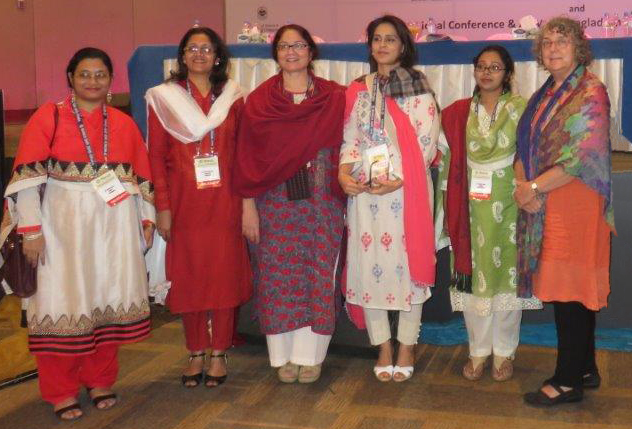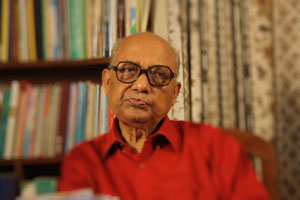From the President: Family Medicine Reforms in South Asia and the Eastern Mediterranean

Photo: Michael Kidd and other WONCA leaders with young doctors from the South Asia region Spice Route movement.
Español
In February I attended the
WONCA South Asia Regional Conference held in Dhaka in Bangladesh. This was an opportunity to join with family medicine colleagues from across South Asia to discuss challenges and opportunities and share stories of success.
Over 25% of the world’s population lives in South Asia, with many people living in dire poverty with limited or no access to health care. WONCA is committed to supporting health service developments in this region.
Many countries in South Asia are struggling with universal health coverage, the challenge of providing health care to all people of this region, and especially those living in rural areas, but we have seen some promising recent reforms. The national government of India, for example, has recognised that health care can only become universal through strengthening primary care, and is working with WONCA and our member organisations in India to bring about improvements in each state of this vast nation. It is a challenging process but centres of excellence in India like the Christian Medical College in Vellore are leading the way in providing excellent experience in community-based family medicine for all their medical students, and in providing training to medical graduates in family medicine.

Delegates to the WONCA South Asia Conference also heard how the Pakistan Medical and Dental Council, after extensive advocacy by family medicine leaders in that country, has stated that all medical schools in Pakistan should establish an academic department of Family Medicine. The Council has also made family medicine a compulsory subject for the undergraduate program in each medical school in Pakistan.
Photo:
Women colleagues in Dhaka wearing brightly coloured outfits for the first day of spring (from r to l): Amanda Barnard, Australia; Nasim Jahan, Bangladesh; Rukhsana Ansari, Pakistan; Sameena Shah, Pakistan;
Marie Andrades, Pakistan; and one other colleague from Bangladesh.
Delegates were also impressed with reports on the MDGP program in Nepal which is training family doctors to provide high quality services, including surgical and obstetric services and management of trauma, in district rural hospitals based in isolated rural communities. The MDGP family doctors are leading a revolution in health care provision to the people of rural Nepal.

In Dhaka I was invited to deliver the annual
National Professor Nurul Islam Memorial Lecture, held in tribute to one of the great global leaders of our profession who died, aged 84 years, in 2013. Professor Islam (pictured) was a physician, teacher and research scientist, with a strong commitment to human rights, health education and tobacco control. As well as establishing the University of Science and Technology in Chittagong in Bangladesh, chairing the first national AIDS committee of Bangladesh, and working as a global leader with the World Health Organization on tobacco control in developing nations, Professor Islam was devoted to working towards ensuring that health care is available to all people, especially the most vulnerable. He once wrote that, “Medicine is a science with human understanding and warmth – selfless, dedicated and wise.” I think this is a wonderful description of our role as family doctors in each of our countries.
WONCA has a strong and growing presence in the countries of South Asia and around the world, with a membership of over half a million family doctors in 140 countries. And WONCA is an inclusive organization. We need to continue our work to ensure that every family doctor, every GP, every primary care doctor, joins us in our commitment to deliver high quality primary care to their patients and their communities.
We also expect WONCA’s members to do their part and share our commitment to education and training, and to the delivery of quality care. And while we recognize that there are excellent doctors working in primary care in many countries who may not have received formal postgraduate training in family medicine, and we welcome these doctors as members of WONCA, we believe that all doctors need to share our commitment to continuing professional development and continuing medical education. We also advocate that new medical graduates should receive formal postgraduate training before being eligible to practice independently as family doctors in the community. Every person and every family in every community deserves high quality medical care from a well-trained and qualified family doctor.
Through WONCA, we also need to expand our commitment to the education and training of family doctors, and quality care and primary care research, to the nations of the world where WONCA does not yet have a strong presence, which includes some nations in the South Asia Region, including Bhutan and the Maldives. WONCA’s membership continues to grow and it has been wonderful to recently welcome family doctors from Bhutan to our WONCA family.
This month the World Health Organization regional office for the Eastern Mediterranean Region (covering 22 nations from Morocco in the west to Afghanistan in the east and including nations in conflict, such as Libya and Syria) has released its new publication on
Strengthening health service provision through a family practice approach: towards universal health coverage in the Eastern Mediterranean Region.
This is a landmark document from a WHO region, with lessons for all nations, and I commend it to you. The document reports on the outcomes of consultations hosted by the WHO Regional Office for the Eastern Mediterranean, in collaboration WONCA, in Cairo, Egypt in November 2014.
WONCA is committed to working with our colleagues in the World Health Organization on continuing to strengthen health service provision in each of the nations of the Eastern Mediterranean Region through a family practice approach. This is essential if we are to achieve universal health coverage for the people of this region. And the lessons learned during implementation of these reforms in this region will inform developments in many other low and middle income nations in other regions of the world.
Michael Kidd
President
World Organization of Family Doctors (WONCA)